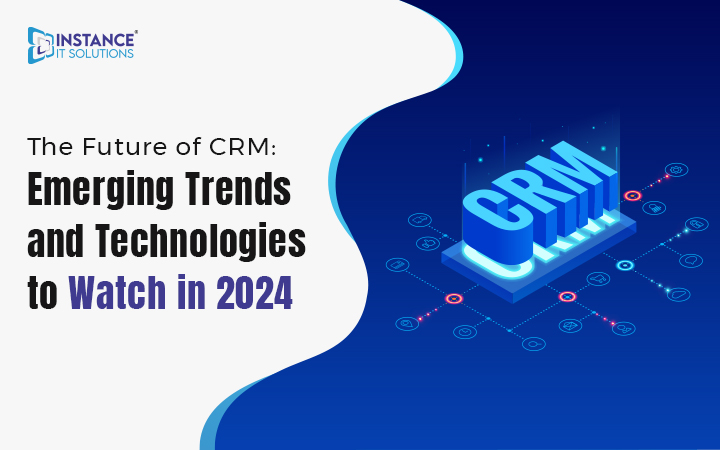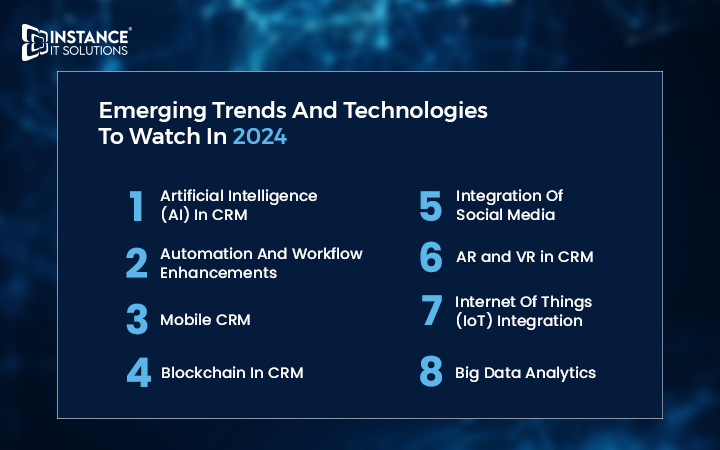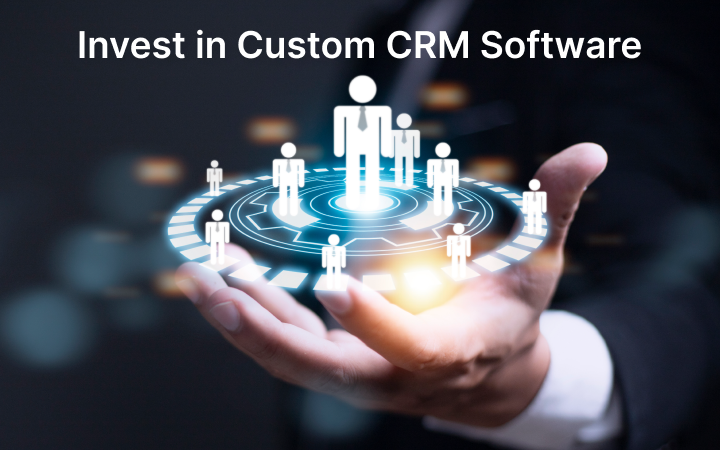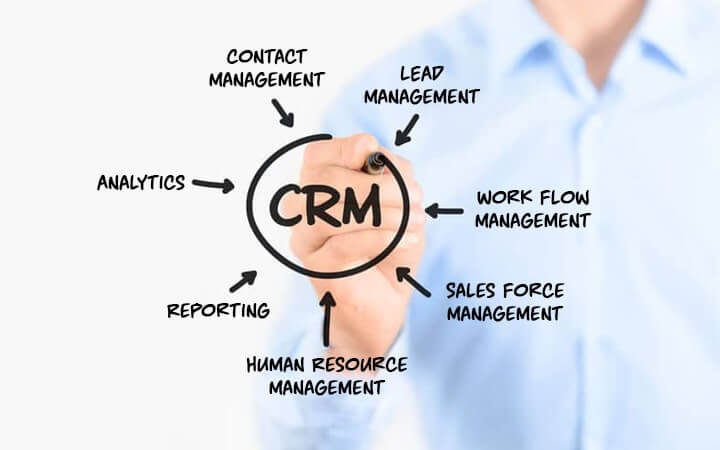CRM in 2024: Future Trends and Technologies Reshaping Business
-

-
Shivendra Saxena
09 Jan, Tue
Content

Introduction
Customer Relationship Management (CRM)Â is a strategic approach that businesses employ to manage and analyze interactions with their current and potential customers.Â
It involves the use of technology to organize, automate, and synchronize sales, marketing, customer service, and technical support processes. The primary goal of CRM is to enhance customer satisfaction and, consequently, foster customer loyalty.Â
CRM systems typically store customer information in a centralized database, allowing businesses to streamline their interactions and provide a more personalized experience. These systems can include data on customer preferences, purchase history, and communication history, enabling businesses to tailor their offerings and communication strategies.Â
Importance Of CRM In Business
CRM plays a pivotal role in modern business operations for several reasons. First and foremost, it helps organizations build stronger relationships with their customers by understanding their needs and preferences. By centralizing customer data, businesses can deliver more targeted and relevant marketing messages, leading to increased customer satisfaction and loyalty.Â
Furthermore, CRM systems streamline internal processes, allowing for more efficient collaboration among different departments. Sales teams can access customer data to better understand their clients, marketing teams can create more targeted campaigns, and customer service teams can provide quicker and more personalized support.Â
The analytical capabilities of CRM systems also contribute to strategic decision-making. By analyzing customer data, businesses can identify trends, forecast future sales, and refine their marketing strategies. This data-driven approach empowers organizations to make informed decisions and stay ahead in the competitive market.Â
Transition To the Future of CRM In 2024
As we step into 2024, the future of CRM is poised for exciting advancements. Artificial Intelligence (AI) and machine learning are expected to play a more significant role in CRM systems, enabling businesses to automate routine tasks, predict customer behavior, and provide even more personalized experiences.Â
Integration with emerging technologies, such as the Internet of Things (IoT), will allow CRM systems to gather data from a myriad of sources, providing a more comprehensive view of customer interactions. This expanded data pool will contribute to even more accurate customer insights and predictive analytics.Â
Moreover, the shift towards cloud-based CRM solutions will continue, offering businesses increased flexibility and scalability. This allows organizations to access their CRM systems from anywhere, facilitating remote work and enhancing overall operational efficiency.
The evolution of CRM is marked by an increasing reliance on advanced technologies and a growing emphasis on data-driven decision-making. As we progress into 2024, businesses that embrace these trends are likely to stay at the forefront of customer relationship management, fostering stronger connections and driving sustained success.Â
Current State of Customer Relationship Management
In the current business landscape, CRM systems have become integral tools for organizations across various industries. The existing CRM landscape is characterized by a diverse range of solutions, from traditional on-premises software to cloud-based platforms.Â
These systems not only manage customer interactions but also serve as comprehensive hubs for sales, marketing, and customer service processes. Despite the benefits, businesses encounter challenges with their current CRM systems. Â
Integration issues, where different departments' data is siloed, can hinder a holistic understanding of the customer. User adoption remains a persistent challenge, as employees may find certain systems complex or time-consuming, leading to underutilization.Â
Additionally, the rapidly evolving technological landscape often leaves businesses struggling to keep their CRM systems up-to-date and aligned with industry standards. There is a growing need for advancements in CRM technology to address these challenges.Â
Businesses are seeking more intuitive, user-friendly interfaces, and seamless integration capabilities. Artificial intelligence and machine learning are increasingly sought after to automate processes, enhance predictive analytics, and deliver more personalized customer experiences.Â
The demand for real-time data accessibility, especially in the context of remote work, is pushing for further developments in cloud-based CRM solutions.Â
As businesses recognize the pivotal role of CRM in maintaining a competitive edge, the call for continuous innovation and improvement in CRM technology remains a priority.Â
8 Emerging Trends in Customer Relationship Management
Emerging trends in Customer Relationship Management include increased integration of AI and machine learning, emphasis on omnichannel experiences, enhanced use of data analytics, and the growing adoption of cloud-based solutions. These trends aim to deliver more personalized, efficient, and scalable interactions between businesses and their customers.

 1. Artificial Intelligence (AI) In CRMÂ
AI enables businesses to analyze vast amounts of customer data, facilitating the creation of highly personalized experiences. This includes tailored marketing messages, product recommendations, and customized communication strategies, fostering stronger customer relationships. AI-driven predictive analytics in CRM systems help businesses anticipate customer behavior and preferences.Â
By analyzing historical data, AI can forecast future trends, enabling organizations to proactively address customer needs and optimize their strategies.Â
AI-powered chatbots and virtual assistants enhance customer support by providing instant, automated responses. These tools handle routine queries, freeing up human agents for more complex tasks. This improves overall efficiency, and responsiveness, and ensures a seamless customer experience around the clock.Â
2. Automation and Workflow EnhancementsÂ
Automation and workflow enhancements in CRM are transforming business operations by streamlining processes, automating tasks, and optimizing workflows for increased efficiency. CRM systems leverage automation to reduce manual efforts, allowing organizations to streamline complex business processes.Â
Enhanced task automation ensures timely and accurate completion of routine activities, freeing up resources for more strategic tasks. Workflow optimization involves refining and structuring processes within the CRM, fostering efficiency across departments, and improving overall productivity. These features not only save time but also contribute to a more seamless and responsive customer relationship management experience.Â
3. Mobile CRMÂ
Mobile CRM involves developing applications for customer relationship management on mobile devices, providing accessibility and flexibility for businesses.Â
With the increasing reliance on smartphones, mobile CRM enables professionals to access customer data, manage interactions, and make informed decisions on the go.Â
In 2024, the benefits of mobile CRM include improved real-time collaboration among teams, enhanced customer engagement, and the ability to respond swiftly to market dynamics. It empowers businesses to stay connected with clients, manage leads efficiently, and adapt to a mobile-centric work environment, ensuring seamless customer relationship management in the modern, dynamic business landscape.Â
4. Blockchain In CRMÂ
Blockchain ensures the security of customer data by employing decentralized and tamper-resistant ledgers. This cryptographic security reduces the risk of data breaches, providing a secure environment for storing and managing sensitive customer information. Blockchain introduces transparency and trust in CRM transactions.Â
It enables a shared, immutable ledger, fostering trust among the parties involved. This transparency is particularly valuable in verifying customer interactions, transactions, and contractual agreements. Blockchain in CRM finds applications in supply chain management, smart contracts for automated agreements, and identity verification. It enhances data accuracy, reduces fraud, and establishes a trustworthy foundation.Â
5. Integration of social mediaÂ
The integration of social media in CRM is pivotal for enhanced customer engagement and insights. Social CRM platforms enable businesses to engage with customers on social media, fostering meaningful interactions and building stronger relationships.Â
CRM systems integrate social media data to provide valuable insights into customer preferences, sentiment analysis, and trends. This information aids businesses in tailoring their products and services to meet customer expectations. Social media integration allows businesses to provide real-time communication and support, addressing customer inquiries and issues promptly, thereby enhancing overall customer satisfaction.Â
6. Technologies Shaping the Future Of CRMÂ
AR and VR are revolutionizing customer interactions by providing immersive experiences. AR overlays digital information onto the real world, while VR creates entirely virtual environments, enhancing the way businesses engage with customers.Â
AR and VR enable businesses to offer virtual product demonstrations and experiences, allowing customers to explore and interact with products in a virtual space.Â
This enhances the purchasing decision-making process and provides a unique, engaging customer experience. In CRM, these technologies find applications in virtual meetings, training sessions, and collaborative environments.Â
They facilitate more dynamic and interactive customer interactions, contributing to a more personalized and futuristic customer relationship management experience.Â
7. Internet of Things (IoT) IntegrationÂ
IoT enables the collection of real-time data from connected devices, providing valuable insights into customer behavior, preferences, and usage patterns.Â
Integrating IoT in CRM allows businesses to create personalized customer experiences by tailoring products and services based on the data collected from IoT-enabled devices.Â
CRM systems leveraging IoT enhance customer interactions by offering a comprehensive view of customer interactions across various touchpoints, enabling businesses to deliver more informed and customized services.Â
8. Big Data AnalyticsÂ
CRM systems utilize big data to extract valuable customer insights from vast datasets, helping businesses understand behaviors, preferences, and trends.Â
Big Data Analytics empowers data-driven decision-making in CRM by providing a foundation for strategic planning, marketing campaigns, and personalized customer interactions based on comprehensive and real-time information.Â
CRM platforms equipped with big data capabilities efficiently manage and analyze large datasets, ensuring businesses can derive meaningful insights and optimize their customer relationship management strategies.Â
CRM will continue to play a pivotal role as businesses navigate dynamic market conditions, emphasizing customer-centric strategies, data-driven decision-making, and agile approaches to meet evolving customer expectations.Â
Conclusion
In the end, Customer Relationship Management remains pivotal in fostering strong customer relationships, streamlining processes, and making data-driven decisions.Â
The integration of AI, IoT, and Big Data is shaping the future of CRM, enhancing personalization and efficiency. To stay ahead in the ever-evolving business landscape, businesses are encouraged to embrace these future CRM trends and technologies.Â
By leveraging advancements organizations can foster deeper connections with customers and navigate the challenges of tomorrow with agility and innovation. Embracing these changes positions businesses for sustained success in the dynamic world of customer relationship management. In case you are looking for an advanced CRM solution for your business, get in touch with Instance IT Solutions right away. We can assist you in succeeding efficiently.Â
Keep Learning
We are trusted by over 650+ clients.
Join them by using our services and grow your business.
Request a callbackRequest a callback





 Contact Us
Contact Us
